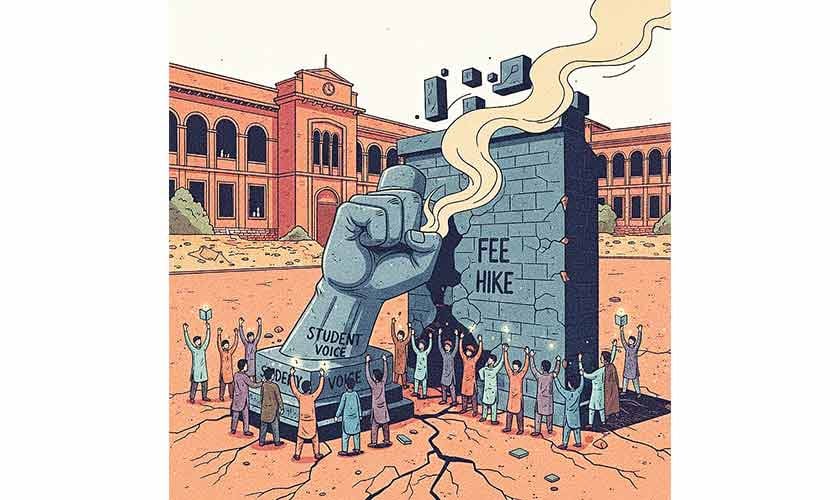The Quiet Menace: Tensions Rise at University of the Punjab Over Fee Hike
The University of the Punjab campus has been enveloped in an unsettling silence—an ominous sign of the ongoing conflict between students and the university administration over a recent increase in fees.
On September 24, the administration adopted a firm stance against protesting students, implementing disciplinary actions that have sparked a heated debate about responsibility for the unrest on campus.
### Disciplinary Measures and Administration’s Stance
Dr. Khurram Shehzad, spokesperson for the University of the Punjab (PU), confirmed that 37 students are currently facing disciplinary action for violating university regulations. Among them, 21 students were fined Rs 20,000 each for their alleged involvement in agitation and violence, while 15 others were placed on a three-month probation.
Further penalties included withholding the result of one student and banning another from entering the campus altogether. According to Dr. Shehzad, these measures aim to restore order and encourage responsible behavior among students through a mix of penalties and counselling.
### Student Groups Speak Out
The Islami Jamiat Talaba (IJT), one of the most active student groups at PU, views the administration’s actions as a deliberate campaign to suppress dissenting voices. They argue the university is unfairly targeting them for opposing what they describe as an indiscriminate increase in tuition and hostel fees.
The IJT claims the administration prioritizes revenue generation over the financial struggles faced by students from middle-class backgrounds. An MPhil student from the Department of Development Communication highlighted the severe financial strain, noting that hostel fees have doubled from Rs 24,000 in 2024 to Rs 48,000 in 2025. Similarly, tuition fees have seen a significant increase.
### Administration’s Justification for Fee Hike
Defending the fee increase, Dr. Shehzad explained, “Back in 2000, a student enrolling in an MSc programme had to pay only Rs 1,200 per year. This fee remained unchanged for many years, which was unsustainable. The recent hike feels sharp simply because there was no adjustment for a long time.”
He further elaborated on the university’s financial challenges, mentioning that a major source of revenue—from private students taking BA and BSc exams—had been eliminated due to policy changes. Additionally, government funding for higher education has drastically decreased, shrinking from around Rs 100 billion in 2017 to about Rs 60 billion today.
Dr. Shehzad also pointed out that the university’s hostels operate at a loss by offering accommodation at only a fraction of the market rate, a model that cannot be financially maintained.
### Contention Over University Policies and Campus Access
The IJT alleges the administration selectively targets them for their opposition to the fee hikes and accuses it of prioritising profits over student welfare.
Dr. Shehzad mentioned PU’s recent campaign to remove illegal occupants from university land, stating that land worth billions of rupees had been reclaimed, allowing for the conversion of several boys’ hostels into facilities for girls.
Speaking to The News on Sunday, Mehr Zain, the IJT nazim for the Old Campus, said that while the IJT initially supported the eviction drive, the administration subsequently failed to provide rooms to legitimate occupants—including out-of-town students enrolled in evening programmes. He argued that the university’s record revenue figures suggest profit-driven motives.
### Beyond Fees: Accusations of Policing and Free Speech Suppression
The dispute is not limited to fee hikes. Fasih-ur Rehman, IJT spokesperson for PU, accused the university of excessive policing and suppression of free expression. He cited instances where police presence was allowed on campus to disperse even neutral events, such as a peaceful Defend Pakistan rally, during which students were reportedly questioned.
Conflicting versions have emerged regarding a recent Students Rights March. The IJT claims their peaceful procession was blocked by armed security guards, sparking a scuffle. Meanwhile, the administration alleges that the IJT’s true motive is to get around 100 expelled activists reinstated.
The administration further accuses IJT members of engaging in illegal activities, including renting out hostel rooms and receiving free services, and claims that their protests are retaliatory responses after losing these privileges.
### The Impact on Regular Students
As tensions continue with no clear resolution in sight, it is the regular students of PU who bear the brunt—navigating an environment filled with uncertainty and unrest amidst the ongoing deadlock between the administration and student groups.
https://www.thenews.com.pk/tns/detail/1346832-institutional-conflict
